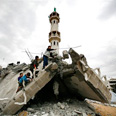
Hamas raising money to rebuild mosques
Gaza government announces fundraising campaign aimed at collecting $25 million needed to restore dozens of mosques completely or partially ruined in IDF strikes
The Hamas government in Gaza announced Sunday it would start raising money to rebuild the mosques destroyed by IDF strikes during Operation Cast Lead.
Dr. Taleb Abu Shaar, minister for religious affairs, launched the fundraising campaign at a special press conference that was held on the ruins of the al-Taqwa mosque in the Sheikh Radwan neighborhood.
Abu Shaar stated that according to experts' estimates, the damage to the mosques totals some $25 million. He said that 45 mosques had been completely destroyed during the war, while 55 were partially damaged and could not currently serve worshippers. Dozens of other mosques sustained slighter damages.
The minimal donation for the rehabilitation project will stand at $400.
Meanwhile, the smuggling of goods through the tunnels on the Philadelphi Route goes on uninterrupted despite the IAF's strikes on the area in recent days. Since the fighting in the Strip concluded last month a new phenomenon of "mobile gas stations" has been thriving in Gaza. These are essentially young teens and boys who stand on the sides of the roads and sell various kinds of petrol to drivers.
Because of the handsome profits to be made from this trade, many grocers have also reportedly left their businesses and started selling gas instead. Sources in Gaza said that the large variety of petrol reflected the flourishing smuggling activity into the Strip.
Dr. Mahmoud Khozander, vice chairman of the Petroleum and Gas Stations Owners Association of Gaza, said that the supply of fuels, including diesel oil, has not been damaged, despite the decision of Israeli gas companies Dor Alon and Paz to shut down fuel supply to Gaza in light of Palestinian debts, estimated to stand at $7.5 million.
Khozander added that the market for diesel oil in the Strip was nowadays based on smuggling from Egypt, and that the smuggled oil was 50% cheaper than the one supplied by the Israeli companies.
Doron Peskin is head of research of Info-Prod Research (Middle East) Ltd.










